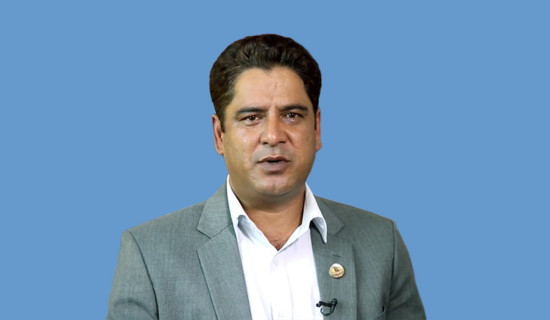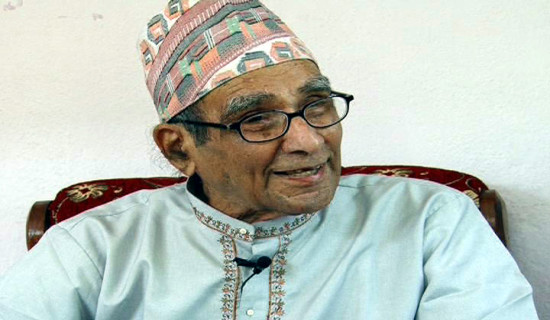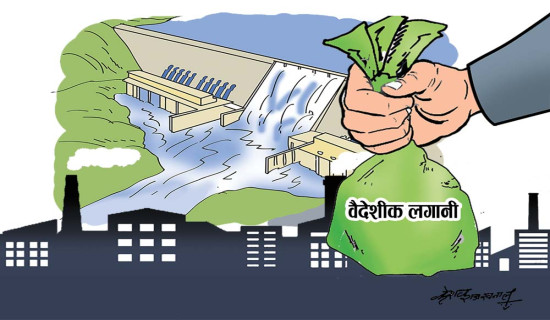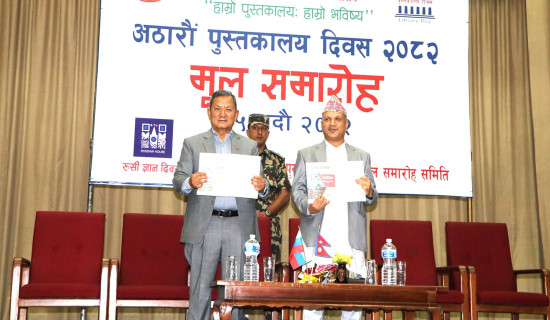- Sunday, 31 August 2025
Technology: Pros And Cons
Ramesh Nath Dawadi
Technology is everywhere. It’s in our phone, our classroom, our hospital, and inside our homes — even in the air we breathe, thanks to filters and sensors. From calling a friend across the world to getting treated for a disease, technology has made life easier, faster, and more connected. But as conscious citizens, we want to see its ultimate effect: is it enriching humanity or draining it? Some people say technology is a boon (a blessing) that helps us grow and solve our big problems. Others believe it’s a curse that causes more problems in society than it fixes.
The real wonders of technology were first noticed during the Enlightenment period (1685–1815). Thinkers like Francis Bacon and René Descartes believed that technology itself is neither good nor bad — it’s neutral. It’s like a tool. A knife can cut vegetables as well as hurt someone. Similarly, a computer can teach us new knowledge as well as spread fake news. So, technology is what we make of it. This idea is called Instrumentalism, which says that the ultimate question is: What are we using it for?
On the flip side, people like Karl Marx, Thorstein Veblen, etc., believed that technology is not just something we use—it actually shapes our world. It changes our daily routine, institutions and the way we prefer to interact with each other. It is labeled Technological Determinism. Its logic is that when the printing press was invented, it didn’t just help people print books—it changed religion, started revolutions, and made literacy a basic skill. Today, the internet is doing something similar. It’s changing how we think, talk, shop, date, and even vote. These thinkers believed that technology pushes society in certain directions, often beyond our control.
The third opinion argues that it is not that technology shapes us but the opposite is true: technology is actually shaped by us—our culture, needs, and values. This idea is named as social constructivism, and the people like Trevor Pinch, Wiebe Bijker, and Bruno Latour believe so. For them, things like phones or bicycles don’t just appear—they are designed through social choices and demand. For example, why do phones have cameras? Because people wanted to take pictures. This school believes technology is a reflection of society.
The fourth opinion comes from the leftists like Karl Marx. They appear quite skeptical about it. One school of thought, named as Frankfurt School, is still carrying over this ideology. Thinkers like Herbert Marcuse and Andrew Feenberg fall under this category. They believed technology often helps those in power—governments, big corporations, and the wealthy. For example, online ads track everything you do. That’s not just “neutral”—that’s powerful companies using technology to control your behaviour. Next, dominant thought comes from phenomenologists, like Martin Heidegger and Don Ihde. Heidegger warned that modern technology makes us see the world as something to be used, not respected. A tree becomes just "wood" for furniture. Phones change our sense of time—have you noticed how fast or slow time feels when you're on your phone? This view reminds us that technology affects our inner life, not just the outside world.
The sixth argument comes from Eco-Philosophy. Thinkers like Arne Naess and Vandana Shiva focused on how technology affects nature. They warned that many modern inventions are built with an “I’m more important than nature” mindset. This has caused pollution, climate change, and loss of biodiversity. But it doesn’t have to be always in that way. Eco-technologies—like solar panels, rainwater harvesting, and green architecture—are made to work with nature, not against it. The next one is the fascinating opinion from Trans Humanist. Their dream is big. They believe technology can make us superhuman—smarter, faster, maybe even live forever by merging with machines! On the other hand, Posthumanists challenge the idea that only humans matter. They explore how machines, AI, and nature might all have their own form of intelligence. These ideas make us rethink what it even means to be “human.”
At last, we have people advocating in terms of Indigenous Cultures. For them, tools and inventions are not just mechanical—they are part of a spiritual and community-based system. For example, indigenous farming methods or water systems are sustainable and often passed down for generations. Today, there’s a push to learn from these traditions to build technology that respects life, land, and community. Thus, it appears to be a more sustainable thought.
So, the evaluation goes this way: Technology is a boon for mankind in several ways. It has facilitated communication, and now we can video call family abroad or chat with friends instantly. It has enhanced education processes. It has made a noticeable impact in healthcare. It has also helped preserve the environment through renewable energy schemes like electric vehicles and smart farming. And, finally, it has made all of us creative, as anybody with a phone can be an artist, filmmaker or game designer. On the flip side, it is deteriorating our mental health, breaching our privacy, losing our jobs, creating social detachment and in some way responsible for harming the environment as well. Thus, this issue is complicated. In reality, technology is like a mirror. It reflects what we value, how we think, and who we want to become.

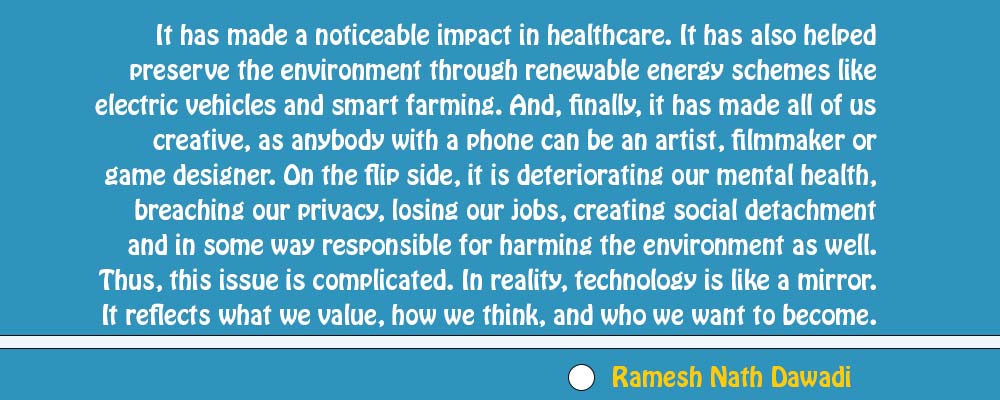








-original-thumb.jpg)
